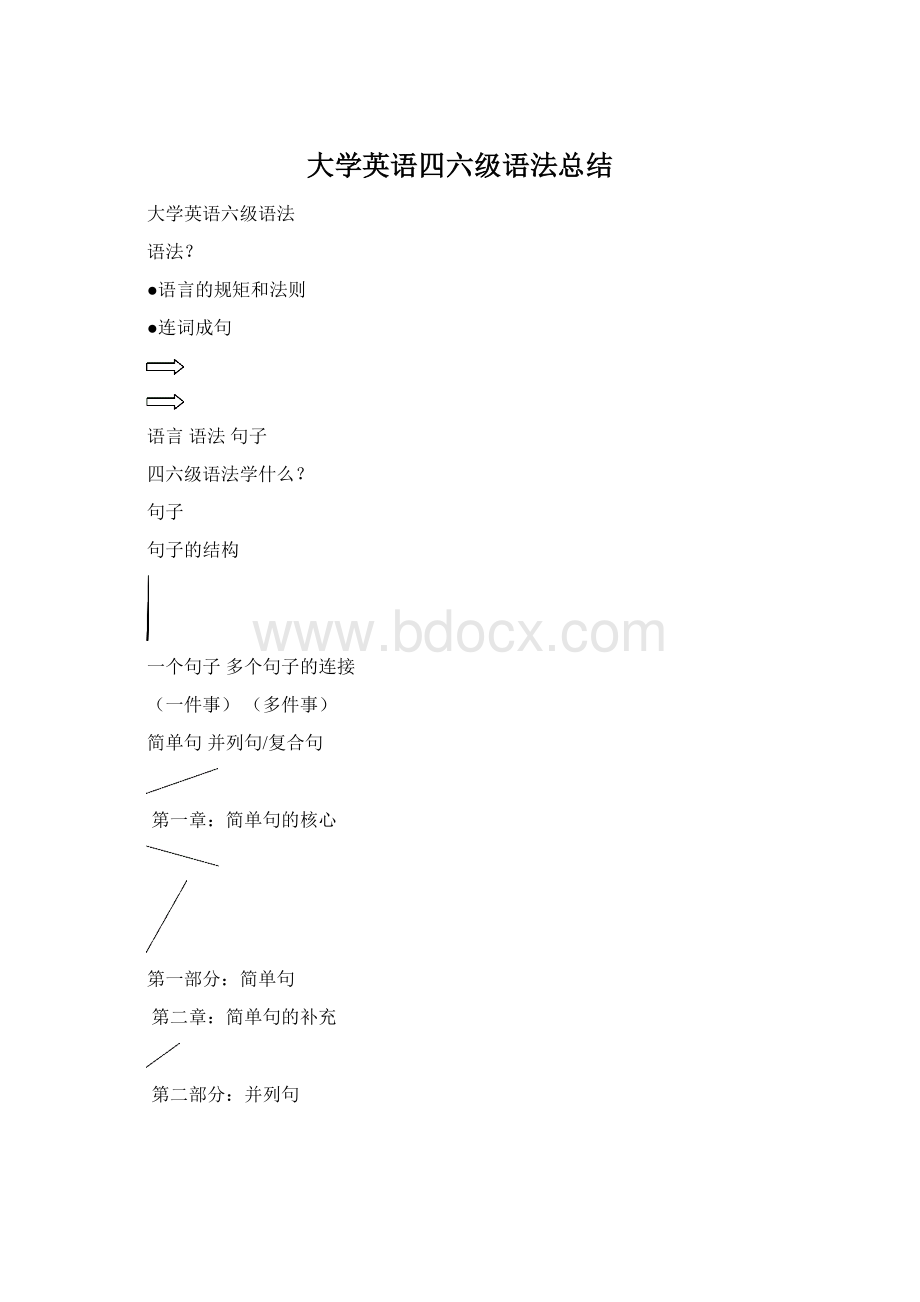 大学英语四六级语法总结Word文件下载.docx
大学英语四六级语法总结Word文件下载.docx
- 文档编号:15842035
- 上传时间:2022-11-16
- 格式:DOCX
- 页数:14
- 大小:162.74KB
大学英语四六级语法总结Word文件下载.docx
《大学英语四六级语法总结Word文件下载.docx》由会员分享,可在线阅读,更多相关《大学英语四六级语法总结Word文件下载.docx(14页珍藏版)》请在冰豆网上搜索。

第四部分:
特殊用途的句子倒装
虚拟
真题应用长难句分析(全真题讲解)
一、简单句的核心构成
简单句一个句子(一件事)
世界是物质的,物质是运动的
n.+v.
主语+谓语
11
n.+谓语v.
一主一谓,谓语动词的不同决定简单句的不同构成。
例子:
Iswim.
IlikeEnglish.
区分vt./vi.
1)意思
2)介词(prep.)
●IlikeEnglish.
●Thebridekissedthegroom.
●Birdsflyinthesky.
●Wewalkedonthestreetyesterday.
●Youlookatme.
介宾结构
●Theyofferedmeavacantpost.
●Theyofferedavacantposttome.
Iboughtyouapresent.
Iboughtapresentforyou.
IfindHongKong?
?
IfindHongKongverybeautiful.
IfindHongKongaplaceforshopping.
●我非常高兴。
●Iveryhappy.?
Iamveryhappy.
主系表
系动词
1.be动词(单独)
2.“变得”getbecometurngogrow
3.感官动词looksoundsmelltastefeel
“看/听/闻/尝/感觉起来……”
4.keepremain/seemappear
1.Iaskyouaquestion.主谓双宾
2.Youanswer.主谓
3.Iloveyou.主谓宾
4.Youmakemylifecomplete.主谓宾补
5.Iamhappy.主系表
主语+谓语+?
二、简单句的核心变化
(一)谓语动词的变化:
1.时态:
一般过去时
形式:
V.过去式(did/was/were)
用法:
过去的事、过去的动作(无关现在)
Hewasastudent.
Helikedmusic.
Shehadaboyfriend.
变否定或疑问:
Hewashappy.
HelikedEnglish.
Hewasnothappy.
HedidnotlikeEnglish.
Washehappy?
DidhelikeEnglish?
Howwashe?
Whatdidhelike?
V.过去式V.过去分词
looklookedlooked
buyboughtbought
seesawseen
eatateeaten
一般过去时完成时
被动语态
不作谓语
一般现在时
V.原形/V.第三人称单数(do/does)
YoulikeEnglish.
HelikesEnglish.
1.现在经常性习惯性的动作
WehavetheEnglishclasseveryday.
Heoftengetsuplate.
2.现在的状态
Iamateacher.
WeareinChina.
3.永恒
Theearthisround.
Theearthmovesaroundthesun.
Knowledgeispower.
Practicemakesperfect.
Heishappy.
Heisnothappy.
YoudonotlikeEnglish.
HedoesnotlikeEnglish.
Ishehappy?
DoyoulikeEnglish?
DoeshelikeEnglish?
Howishe?
Whatdoyoulike?
Whatdoeshelike?
补充:
与频率连用(every,onceaweek,twiceamonth,threetimesa…)
always
usually,often,frequently
sometimes,hardly
never
一般将来时
will/am/is/aregoingto+V原形
将来的事(现成的将来)
Iwillmakeanewplantomorrow.
Wearegoingtostudyabroadnextyear.
Hewillleave.
Heisgoingtoleave.
Hewillnotleave.
Heisnotgoingtoleave.
Willheleave
Ishegoingtoleave?
Whatwillhedo?
Whatishegoingtodo?
过去将来时
would/was/were/aregoingto+V原形
将来的事(过去的将来)
IsaidthatIwouldbecomeacookinthefuture.
Tonyfinishedhiswork,andthenhewouldleaveforLondon.
3种进行时
At10o’clockyesterdaysomestudentsweretakinganexamintheirclassrooms.
Wearetakingaboutthewaterpollution.
Agreatmanycandidateswillbemeetinghereatthistimetomorrow.
现在完成时
have/has+done
现在全部完成Hehasleft.
现成部分完成WehavestudiedEnglishfortenyears.
过去完成时
had+done
过去的之前
Whenhegotthere,shehadleft.Shewasnotthere.
完成时vs.完成进行时
They_____ontheprogramforalmostoneweekbeforeIjoinedthem,andnowwearestillworkingonitasnogoodresults_____sofar.
A.havebeenworking;
havecomeout
B.hadworked;
cameout
C.hadbeenworking;
havecomeout
D.haveworked;
arecomingout
2.语态:
n.+v.
动词的时态
动词的语态
动词的情态
谓语动词的变化语态
被动语态
狗吃了那个蛋糕。
Thedogatethecake.
?
吃了那个蛋糕。
蛋糕被吃了。
狗吃了那个蛋糕。
主语宾语
蛋糕被狗吃了。
被动语态适用范围1:
及物动词。
2:
不及物动词+介词。
be+done
被动的时间被动的动作
备注:
1.be表示被动的时间(把be变成对应的各种形态),还表达主语单复数
2.done表示被动的动作
教室每天都打扫。
Classroomsarecleaned(clean)everyday.
一座新的大楼去年建造的。
Anewbuildingwasbuilt(build)lastyear.
与时态相结合
被动语态be+done
他每天被打。
Heisbeateneveryday.
他昨天被打了。
Hewasbeatenyesterday.
他明天将要被打。
Hewillbebeatentomorrow.
他现在正在被打。
Heisbeingbeaten.(现在经行时的被动am/is/are+beingdone)
他现在已经被打了。
Hehasbeenbeaten.(现在完成时的被动have/has+beendone)
Ourmorningpaperisread(read)byover200,000peopleeveryday.
LastnightmyfavoriteTVprogramwasinterrupted(interrupt)byaspecialnewsbulletin.
Hisbikewillberepaired(repair)byhisgrandfathertomorrow.
Thenewmachinehasbeenused(use)inourfactoryfortwoweek.
与情态动词相结合
被动语态be+done
Planesareheard.
Planescanbeheard.
Planescouldbeheard.
Planesmaybeheard.
Planesmustbeheard.
这封信必须马上寄出。
Thelettermustbesentimmediately.
天气不能被人们所控制。
Weathercannotbecontrolledbypeople.
3.情态:
1)情态动词+动词原形
2)情态动词的人称变化无
3)情态动词的时态变化有限
4)情态动词变否定/疑问
四六级常用的情态动词有:
must“必须”can/could“能够,可以”will/would“愿意/将要”
may/might“可以,可能”should“应该”
1情态动词表示情态
Wemustfinishtheworkwithinaweek.
Airpollutionmustbetakenseriously.
Thegovernmentcansolvetheproblemofwaterpollution.
Tonycouldwalkwhenhewasonlyoneyearold.
Willyoumarryme?
- 配套讲稿:
如PPT文件的首页显示word图标,表示该PPT已包含配套word讲稿。双击word图标可打开word文档。
- 特殊限制:
部分文档作品中含有的国旗、国徽等图片,仅作为作品整体效果示例展示,禁止商用。设计者仅对作品中独创性部分享有著作权。
- 关 键 词:
- 大学 英语 四六 语法 总结
 冰豆网所有资源均是用户自行上传分享,仅供网友学习交流,未经上传用户书面授权,请勿作他用。
冰豆网所有资源均是用户自行上传分享,仅供网友学习交流,未经上传用户书面授权,请勿作他用。


 如何打造酒店企业文化2刘田江doc.docx
如何打造酒店企业文化2刘田江doc.docx
